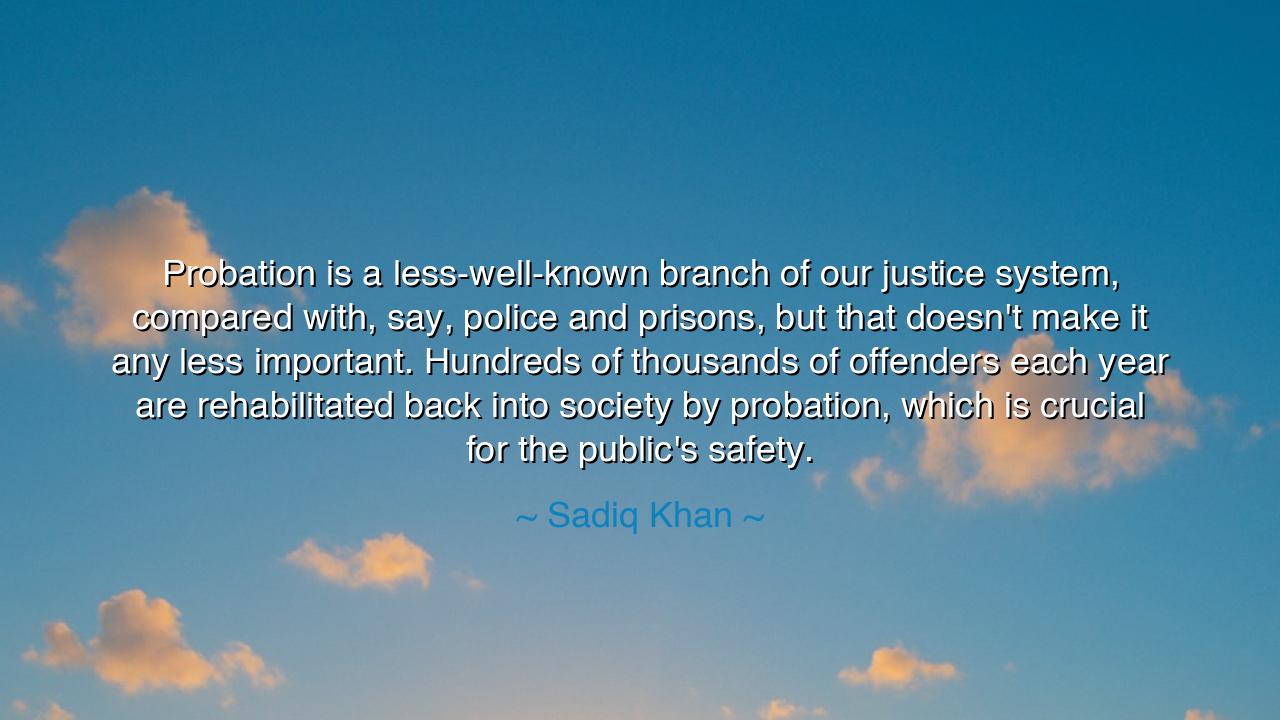
Probation is a less-well-known branch of our justice system
Probation is a less-well-known branch of our justice system, compared with, say, police and prisons, but that doesn't make it any less important. Hundreds of thousands of offenders each year are rehabilitated back into society by probation, which is crucial for the public's safety.






Sadiq Khan, speaking as one who has walked in the world of law and governance, declared: “Probation is a less-well-known branch of our justice system, compared with, say, police and prisons, but that doesn’t make it any less important. Hundreds of thousands of offenders each year are rehabilitated back into society by probation, which is crucial for the public’s safety.” These words, though rooted in the modern machinery of justice, carry the same wisdom known to the ancients: that the greatness of a people is not measured only by how they punish, but by how they restore.
The meaning here is powerful and deeply human. Probation is the quiet path, less visible than the flashing lights of police or the towering walls of prisons. Yet it holds within it the seed of renewal. It is the bridge between punishment and belonging, between crime and redemption. Through it, the offender is not discarded but guided—given both discipline and support to walk once more in the ways of honest life. And in this restoration lies true safety, for a healed soul does not return to harm, but instead contributes to the strength of the community.
History offers many examples of this truth. In ancient Athens, the principle of metanoia—the change of heart—was recognized as essential to justice. Citizens who committed wrongs could, in certain cases, be guided back into the life of the polis through service, atonement, or education. The Athenians knew that endless punishment created only enemies within, while renewal created citizens once more. In our time, probation carries this same spirit: that society is safer when people are restored, not merely locked away.
Consider also the story of postwar Japan. After the devastation of the Second World War, millions who had participated in a militarized state faced judgment. Yet rather than endless vengeance, new systems were built to rehabilitate—to re-educate, to reintroduce values of democracy and peace. The result was not chaos, but one of the most stable societies of the modern age. Here we see again Khan’s wisdom: justice that restores is the surest safeguard for the future.
Yet, the world often forgets this. The glare of prisons and the drama of policing consume attention, while probation—the quiet work of counselors, mentors, and officers guiding offenders back into life—remains unsung. But let us remember: it is easy to destroy, but far harder and more noble to rebuild. The strength of a justice system is not found in how many it cages, but in how many it frees to walk rightly again.
The lesson for us is clear: never despise the hidden labor of restoration. In our homes, our schools, our communities, we too must learn to balance judgment with mercy, punishment with hope. When one stumbles, do not cast them out forever; instead, hold them accountable while giving them a path to rise again. This is what probation represents at the level of nations, and it is what compassion must represent at the level of individuals.
Practical action lies before us. Support programs that focus on rehabilitation rather than endless punishment. Speak of the value of probation, and honor those who work tirelessly in this quiet branch of justice. Teach your children that mistakes, though serious, do not erase humanity. And when you encounter someone who has fallen, be part of their path back to society, not their descent into despair.
Thus, let Khan’s words be remembered: “Probation… rehabilitates hundreds of thousands into society, which is crucial for the public’s safety.” This is not weakness, but the highest form of strength. For any people can punish—but only the wise can restore. And when restoration becomes the soul of justice, then a nation not only protects itself from harm, but also plants the seeds of a nobler, more enduring peace.






AAdministratorAdministrator
Welcome, honored guests. Please leave a comment, we will respond soon